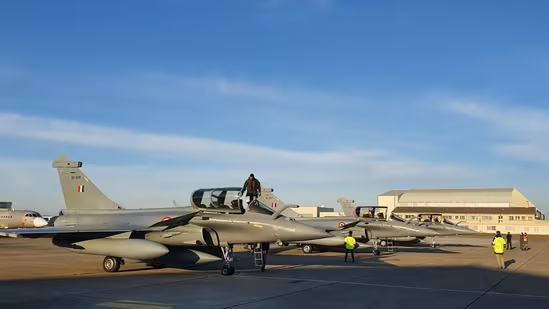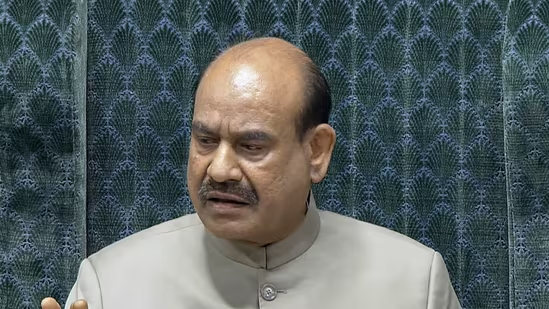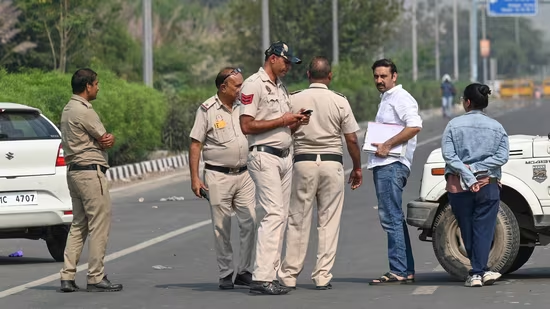Each SSGN can carry 154 Tomahawk cruise missiles, 50 per cent more than US guided-missile destroyers pack and almost four times what the US Navy’s newest attack subs are armed with, CNN reported.
Washington: The United States military on Monday announced that a guided missile has arrived in West Asia. The US Central Command took to its social media ‘X’, and stated that an Ohio-class submarine arrived in the US Central Command area of responsibility on November 5. According to CNN, the arrival of the missile seemed intended to display a message of deterrence clearly directed at regional adversaries like Iran and its proxies as the Biden administration tries to avoid a broader conflict amid the Israel-Hamas war.
The post was accompanied by a picture which appears to show a guided missile submarine in the Suez Canal passing under the Al Salam Bridge northeast of Cairo. The submarine joins a number of other US Navy assets already in the area, including two carrier strike groups and an amphibious ready group, reported CNN.
However, the social media post did not mention the sub, but the US Navy has four Ohio-class guided missile submarines (SSGNs), that are former ballistic missile subs converted to fire Tomahawk cruise missiles rather than nuclear-tipped ballistic missiles.
Each SSGN can carry 154 Tomahawk cruise missiles, 50 per cent more than US guided-missile destroyers pack and almost four times what the US Navy’s newest attack subs are armed with, CNN reported.
Each Tomahawk can carry up to a 1,000-pound high-explosive warhead. According to an interview he gave to CNN in 2021, Carl Schuster, a former director of operations at the US Pacific Command’s Joint Intelligence Center said that “SSGNs can deliver a lot of firepower very rapidly.”
The US broadcaster noted that the first time the SSGNs were used in combat was in March 2011, when the guided missile sub USS Florida fired almost 100 Tomahawks against targets in Libya during Operation Odyssey Dawn.
Blinken continues to tour West Asia
The announcement of the arrival of an Ohio-class submarine comes after US Secretary of State Antony Blinken held a series of talks with US partners in West Asia. Blinken is on a visit to West Asian countries, including Turkey, Iraq, Israel, the West Bank, Jordan and Cyprus in a renewed push to prevent the escalation of Gaza war.
Israel Claims It Has Cut Gaza In Half; US Pushes For Pause In Fighting
The Israeli Army today claimed a decisive turn in the ongoing conflict, with “significant strikes” targeting Hamas positions and a bold statement that the Gaza Strip has been “cut into two,” according to reports from CNN. Daniel Hagari, an Army spokesperson, announced that Israeli forces have effectively “encircled Gaza City,” resulting in the division of Gaza into a north and south region. “Troops have reached the coastline and secured it,” he added.
Surging strikes on Hamas terror infrastructure
“There are now widespread strikes on terror infrastructure – below ground and above it,” as reported by Al Jazeera, quoting Hagari. In a related development, LTG Herzi Halevi, Chief of the General Staff, confirmed during a meeting in the Northern Command that the Israeli Defense Forces (IDF) stand ready to act swiftly in the northern Gaza region. “We have a clear goal of restoring significantly improved security at the borders, not only in the Gaza Strip… We are prepared to strike in the north at any moment,” the IDF posted on X (formerly Twitter).
Intense airstrikes and explosions
The northern part of the Gaza enclave has witnessed intense airstrikes and massive explosions, marking the most substantial escalation since the conflict began. These attacks have once again disrupted phone and internet services.
Israeli Prime Minister Benjamin Netanyahu, in a statement reported by The Times of Israel, declared on Sunday that Israel will not consider a ceasefire until the Hamas terror group releases the hostages it is holding. He emphasized, “Take this word ‘ceasefire’ out of the lexicon. We will continue until we defeat them; we do not have an alternative.”
On the international stage, Israel’s envoy to the US, Michael Herzog, described Gaza as the world’s “biggest terror complex,” according to Times of Israel. Herzog expressed concern about the extensive presence of fighters, rockets, and underground tunnels in Gaza, emphasizing the need to eliminate this threat to prevent further attacks.
Troops expected to enter Gaza City
Israeli media has reported that Israeli troops are preparing to enter Gaza City within the next 48 hours. Residents in northern Gaza have witnessed powerful explosions after nightfall.
Communication Blackout
The “collapse in connectivity” across Gaza, reported by internet access advocacy group NetBlocks.org and confirmed by Palestinian telecom company Paltel, has further complicated the situation. UN Palestinian refugee agency spokesperson Juliette Touma expressed concern about communication loss with the majority of the UNRWA team members.
Despite international appeals and demonstrations, Israel continues its bombardment across Gaza. Critics argue that Israel’s strikes often result in a disproportionate number of civilian casualties, given the densely populated urban areas in the region.
Over 4,000 children dead
The Palestinian health ministry said more than 9,700 Palestinians have been killed in the territory in nearly a month of war, more than 4,000 of them children. That toll likely will rise as Israeli troops advance into dense, urban neighbourhoods. The United Nations, which is providing shelter to many of the 1.5 million displaced Gazans, reports damage to 48 of its sites across the Gaza Strip since the start of the conflict.






























